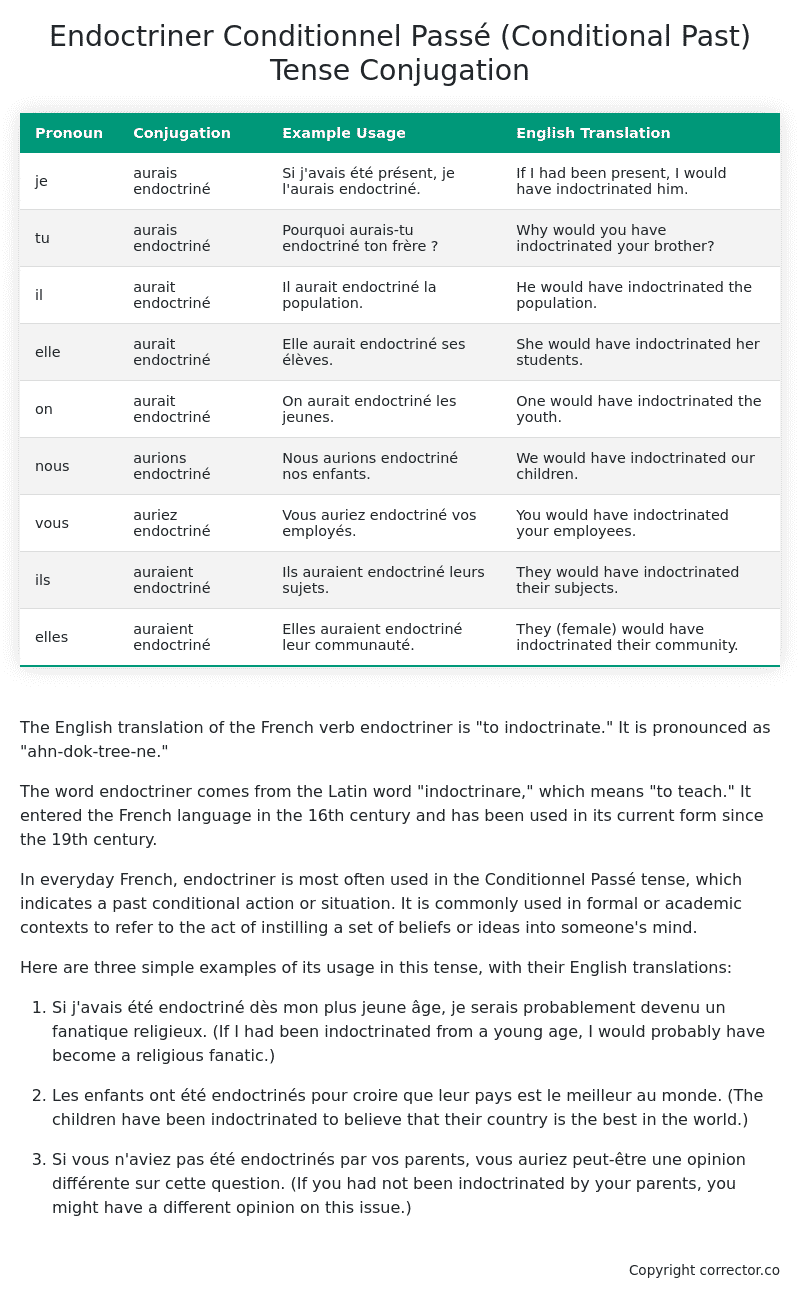Conditionnel Passé (Conditional Past) Tense Conjugation of the French Verb endoctriner
Introduction to the verb endoctriner
The English translation of the French verb endoctriner is “to indoctrinate.” It is pronounced as “ahn-dok-tree-ne.”
The word endoctriner comes from the Latin word “indoctrinare,” which means “to teach.” It entered the French language in the 16th century and has been used in its current form since the 19th century.
In everyday French, endoctriner is most often used in the Conditionnel Passé tense, which indicates a past conditional action or situation. It is commonly used in formal or academic contexts to refer to the act of instilling a set of beliefs or ideas into someone’s mind.
Here are three simple examples of its usage in this tense, with their English translations:
-
Si j’avais été endoctriné dès mon plus jeune âge, je serais probablement devenu un fanatique religieux. (If I had been indoctrinated from a young age, I would probably have become a religious fanatic.)
-
Les enfants ont été endoctrinés pour croire que leur pays est le meilleur au monde. (The children have been indoctrinated to believe that their country is the best in the world.)
-
Si vous n’aviez pas été endoctrinés par vos parents, vous auriez peut-être une opinion différente sur cette question. (If you had not been indoctrinated by your parents, you might have a different opinion on this issue.)
Table of the Conditionnel Passé (Conditional Past) Tense Conjugation of endoctriner
| Pronoun | Conjugation | Example Usage | English Translation |
|---|---|---|---|
| je | aurais endoctriné | Si j’avais été présent, je l’aurais endoctriné. | If I had been present, I would have indoctrinated him. |
| tu | aurais endoctriné | Pourquoi aurais-tu endoctriné ton frère ? | Why would you have indoctrinated your brother? |
| il | aurait endoctriné | Il aurait endoctriné la population. | He would have indoctrinated the population. |
| elle | aurait endoctriné | Elle aurait endoctriné ses élèves. | She would have indoctrinated her students. |
| on | aurait endoctriné | On aurait endoctriné les jeunes. | One would have indoctrinated the youth. |
| nous | aurions endoctriné | Nous aurions endoctriné nos enfants. | We would have indoctrinated our children. |
| vous | auriez endoctriné | Vous auriez endoctriné vos employés. | You would have indoctrinated your employees. |
| ils | auraient endoctriné | Ils auraient endoctriné leurs sujets. | They would have indoctrinated their subjects. |
| elles | auraient endoctriné | Elles auraient endoctriné leur communauté. | They (female) would have indoctrinated their community. |
Other Conjugations for Endoctriner.
Le Present (Present Tense) Conjugation of the French Verb endoctriner
Imparfait (Imperfect) Tense Conjugation of the French Verb endoctriner
Passé Simple (Simple Past) Tense Conjugation of the French Verb endoctriner
Passé Composé (Present Perfect) Tense Conjugation of the French Verb endoctriner
Futur Simple (Simple Future) Tense Conjugation of the French Verb endoctriner
Futur Proche (Near Future) Tense Conjugation of the French Verb endoctriner
Plus-que-parfait (Pluperfect) Tense Conjugation of the French Verb endoctriner
Passé Antérieur (Past Anterior) Tense Conjugation of the French Verb endoctriner
Futur Antérieur (Future Anterior) Tense Conjugation of the French Verb endoctriner
Subjonctif Présent (Subjunctive Present) Tense Conjugation of the French Verb endoctriner
Subjonctif Passé (Subjunctive Past) Tense Conjugation of the French Verb endoctriner
Subjonctif Imparfait (Subjunctive Imperfect) Tense Conjugation of the French Verb endoctriner
Conditionnel Présent (Conditional Present) Tense Conjugation of the French Verb endoctriner
Conditionnel Passé (Conditional Past) Tense Conjugation of the French Verb endoctriner (this article)
L’impératif Présent (Imperative Present) Tense Conjugation of the French Verb endoctriner
L’infinitif Présent (Infinitive Present) Tense Conjugation of the French Verb endoctriner
Struggling with French verbs or the language in general? Why not use our free French Grammar Checker – no registration required!
Get a FREE Download Study Sheet of this Conjugation 🔥
Simply right click the image below, click “save image” and get your free reference for the endoctriner Conditionnel Passé tense conjugation!

Endoctriner – About the French Conditionnel Passé (Conditional Past) Tense
Formation
Common Everyday Usage Patterns
Expressing Unreal Past Scenarios
Polite Requests or Suggestions
Expressing Doubt or Uncertainty
Interactions with Other Tenses
Conditional Present
Indicative Past Tenses
Conditional Future
Summary
Want More?
I hope you enjoyed this article on the verb endoctriner. Still in a learning mood? Check out another TOTALLY random French verb conjugation!


